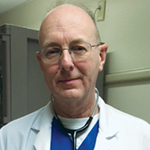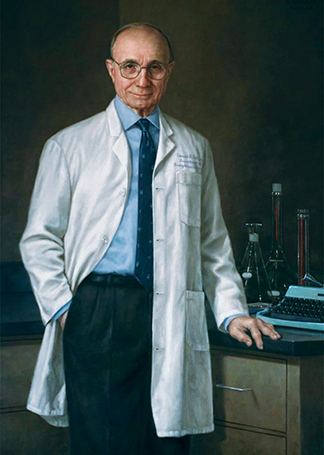By LISA EISENHAUER
When the Edmund D. Pellegrino Center for Clinical Bioethics at Georgetown University Medical Center in Washington started its ethics newsletter in July 2020, the nation was in the thick of the COVID-19 pandemic and roiled by racial unrest over the police killing of George Floyd.
 Roberts
RobertsDr. Allen H. Roberts II, editor-in-chief of the newsletter called The Pellegrino Report: Bioethics in Practice, said the launch at a time when health care equity and racial justice were at the top of the national conversation was coincidental. The newsletter had been in the conceptual stages for months.
Nevertheless, the newsletter jumped right into the conversation, with a first report titled "Pandemic and Pandemonium: Navigating Multiple Levels of Upheaval." The piece was by Dr. Myles Sheehan, a Jesuit priest. He holds the David Lauler chair of Catholic health care ethics and is a professor of medicine at Georgetown University School of Medicine. Fr. Sheehan directs the Pellegrino Center.
In the article, Fr. Sheehan exhorted practitioners to show the same compassion and regard to people imperiled by structural racism as they have for those stricken with COVID.
"Lives were saved, and those who died from this illness were treated with respect and reverence for their dignity and value as human beings," Fr. Sheehan wrote. "Our response to the events that have followed the murder of George Floyd, and others, needs to be as focused on the value and dignity of those whose lives are most threatened by systemic racism, structural violence and inequality."
Protecting the vulnerableIn the 2½ years since its founding, the monthly newsletter has continued to provide reflections and guidance on ethical issues from a Catholic perspective. The newsletter was specifically developed as a resource for practitioners at MedStar Georgetown University Hospital, Georgetown's academic health system partner. The hospital's clinical ethics committee collaborated in the newsletter's creation.
 This portrait of Edmund D. Pellegrino, a founder of modern bioethics, hangs at Georgetown University Medical Center. He is the inspiration behind the Edmund D. Pellegrino Center for Clinical Bioethics and its ethics newsletter.
This portrait of Edmund D. Pellegrino, a founder of modern bioethics, hangs at Georgetown University Medical Center. He is the inspiration behind the Edmund D. Pellegrino Center for Clinical Bioethics and its ethics newsletter.About 1,400 medical staff members and more than 500 resident physicians get each edition by email and a link to it is shared in weekly communications from hospital leadership. The newsletter also is available online for anyone with an interest in Catholic health care ethics to read.
Roberts noted that while other groups and health care facilities have created newsletters that delve into ethics — among them is Health Care Ethics USA, a quarterly produced by CHA in partnership with Saint Louis University — The Pellegrino Report is unique in that it specifically applies the teachings of the Pellegrino center's founder and namesake to practical matters.
Pellegrino was a physician, philosopher and ethicist. Considered to be one of the founders of modern bioethics, he published more than 600 articles and wrote or co-wrote more than 23 books on medical science, philosophy and ethics. He was the founding editor of the Journal of Medicine and Philosophy. He died in 2013.
In Roberts' view, Pellegrino took a logical and scientific approach to framing medical ethics. "He has set the medical principles in the light of Catholic thinking and all of his writing is for the protection and the safety of individual patients," Roberts said. "More importantly, or as importantly perhaps, is protecting the vulnerable among us to ensure the sacredness of every human life."
In short, Roberts said, Pellegrino believed that ethical medical care should be focused on providing "the right and good healing action and decision for every patient in every clinical encounter."
Religious directives explained
In addition to emphasizing the teachings of Pellegrino, Roberts said the newsletter's content aligns with and illuminates the Ethical and Religious Directives for Catholic Health Care Servicesestablished by the United States Conference of Catholic Bishops. Roberts called the directives "beautiful, practical testimony" to the Catholic faith.
Fr. Sheehan has written several pieces for the newsletter that explain or reflect on the directives. For the January 2023 edition, he focused on the section about social responsibility. He wrote that the section encourages Catholic health care providers "to reflect on the fact that we work in a system where there are health care disparities, where a person's ZIP code may tell you if they will live a longer or shorter life, and where the legacy of racism and discrimination can still spread its poison, even if we do not notice it."
Along with Roberts and Fr. Sheehan, Marti Patchell, administrative consultant to the Pellegrino center, and Maria Maisto, academic and program specialist at the center, round out the newsletter's editorial board. They meet twice a month to discuss topics for the publication. Roberts extends invitations for article submissions to people at the center, the university and the hospital based on those topics.
Recent newsletter topics have included the connection between ethics and hope, the dilemmas created by the absence of a medical surrogate and caring for premature infants.
Inspiring the next generation
Roberts' medical career has included 20 years in the U.S. Navy Medical Corps and serving as White House physician under President George H.W. Bush before becoming a professor at Georgetown University Medical Center and a physician executive at MedStar Georgetown University Hospital. He says he never expected his resume to include "editor-in-chief," but is pleased to be a part of a worthy endeavor. "We want to keep Pellegrino and his work alive in the imaginations of the next generation," he said.